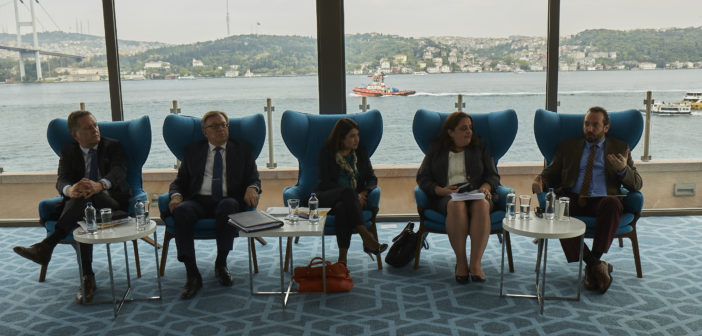
As EDAM, we were honored to be part of the highly selective group of think tanks NATO HQ has asked to organize a series of events all around the Alliance under the theme of “New Perspectives on Shared Security – NATO’s Next 70 Years”. We were further delighted by the recognition of our research on Artificial Intelligence and its impact on defense capabilities via the attribution of the sub-theme “Wars of none: Artificial Intelligence and the future of conflict” to our organization. On Tuesday, 14th of May 2019, we hosted a selective group of high-level experts from the Turkish Ministry of Foreign Affairs, several NATO bodies, academia and private sector during a series of closed-door sessions. The day started with the welcome speech of EDAM’s Chairman Sinan Ülgen. This warm welcoming was followed by a keynote speech by NATO’s Assistant Secretary General for Public Diplomacy Ambassador Tacan Ildem.
1. Current Challenges Facing the Alliance
The first closed-door session was about the current and future challenges facing the Alliance. Here, we had a dual debate. On the one hand, participants discussed the main issues NATO as an organization is facing. On the other hand, we had a lively debate on the current position of Turkey within the Alliance. Regarding the first debate, several experts have pointed out the need for NATO to have a more holistic approach, especially for its southern flank. Another important recommendation has been the need for a higher level of readiness and resilience against cyber and hybrid warfare. Last but not least, participants have advocated for deeper cooperation between NATO and civilian actors, especially regarding cyber capabilities.
The debate on Turkey’s NATO membership was more heated. Here, participants pointed out the significance of the Ankara-Washington bilateral relations on Turkey’s approach to the Alliance. There was a consensus on the fact that better communication between Ankara, Washington and Brussels was a must in order to avoid further misunderstandings among allies. One interesting idea was that NATO as an organization can become a key actor to improve the relations between the two allies. Participants agreed on the critical value of Turkey’s NATO membership for both the Alliance and Ankara.
2. Wars of None: Artificial Intelligence and the Future of Conflict
The second closed-door session was dedicated to the special sub-theme attributed to EDAM “Wars of none: Artificial Intelligence and the future of conflict”. We had three thought-provoking presentations during this session. The first presentation was from Can Kasapoğlu, Director of EDAM’s Security and Defense Studies Program. He offered participants an insight into the unprecedented impact artificial intelligence will have on the homo sapiens by presenting parallels between nature, human history, and the evolution of AI. His presentation was followed by Markku Mantila’s, Branch Chief of Technical and Scientific Development Branch at the NATO Strategic Communications Centre of Excellence in Riga. Mantila offered us an overview of how strategic communication has become a key tool for state and non-state actors to harm citizens and security forces. Lastly, Barış Kırdemir, EDAM-Bosch Cyber Fellow, made the link between AI and information warfare. This session ended with the presentation of EDAM’s Security and Defense Studies Program’s recommendations for NATO’s approach to the challenges and opportunities of AI. These recommendations and further analysis of the issue may be found in the EDAM’s latest paper prepared for this event.
3. Public Session: Challenges and Opportunities to NATO’s Mission for the Next 70 Years
The conference ended with a public session during which a highly valuable panel offered a summary of discussions held during the day. We were honored to host NATO’s Assistant Secretary General for Public Diplomacy Ambassador Tacan Ildem, Director General for International Security Affairs in the Ministry of Foreign Affairs Ambassador Alper Coşkun, Nilsu Gören from the Center for International Security Studies of the University of Maryland and Can Kasapoğlu. This session has been moderated by Barçın Yinanç from Hurriyet Daily News. The audience of this session was a mixed group of experts from the defense industry and academia.









